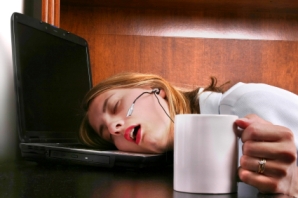 Staying up late to try to get a lot done? You could be harming your weight loss efforts, a new study shows. Researchers at Northwestern University have studied the cumulative effects of lack of sleep on 52 adults. More than half of those who participated in the study had normal sleep habits, defined by the study as the midpoint of sleep occurring before 5:30 a.m. The remainder of those in the study got less sleep and went to sleep later overall.
Staying up late to try to get a lot done? You could be harming your weight loss efforts, a new study shows. Researchers at Northwestern University have studied the cumulative effects of lack of sleep on 52 adults. More than half of those who participated in the study had normal sleep habits, defined by the study as the midpoint of sleep occurring before 5:30 a.m. The remainder of those in the study got less sleep and went to sleep later overall.
The study, published online in the journal Obesity, found that those who went to bed later ate more junk food, ate less fruit and vegetables and drank more full calorie soda. The late sleepers ate much less at their morning meal, and their calorie intake skyrocketed as the day went on. They consumed more calories overall at their evening meal than those participants who went to bed earlier. The research didn’t prove the reason behind these choices, however. did the late sleepers eat more junk food because their choices were limited, or because of their preference?
In my own experience, staying up late has indeed lead to poor food choices, and often to eating more as well. Especially if I am working late, I will often use food to stay awake and keep my mind alert. It becomes a vicious cycle, one that could be stopped by just getting myself to bed earlier.
Lack of sleep has been tied to diabetes and obesity.
Multiple scientific studies have proven time and again that the most commonly cited effect of sleep deprivation is hormonal disturbances, specifically involving the hormones leptin and ghrelin. When you don’t get enough sleep, your body has too little leptin and too much ghrelin. Leptin is the hormone that controls the regulation of your appetite, metabolism and how your body burns calories. Leptin tells your brain when you are full and notifies your body when it’s time to start burning off those calories. As you sleep, your leptin levels rise and your body feels as if it has plenty of energy stored to deal with the upcoming day. Don’t get enough sleep? Your brain perceives this lack of leptin as a need to increase food, in order to make it through the day, and your appetite kicks in – even if you aren’t really hungry.
 Ghrelin actually works in opposition to leptin. Ghrelin tells your brain when you need to eat, when it should stop burning calories and when it should store energy as fat. As you sleep, levels of ghrelin in your body decrease, due to the fact that sleeping burns less calories than daily life. People who don’t sleep enough end up with too much ghrelin in their bodies, leading the body to think it is hungry and has a higher caloric need. The body also stops burning those calories because it thinks there’s a shortage.
Ghrelin actually works in opposition to leptin. Ghrelin tells your brain when you need to eat, when it should stop burning calories and when it should store energy as fat. As you sleep, levels of ghrelin in your body decrease, due to the fact that sleeping burns less calories than daily life. People who don’t sleep enough end up with too much ghrelin in their bodies, leading the body to think it is hungry and has a higher caloric need. The body also stops burning those calories because it thinks there’s a shortage.
We’ve all heard from our parents, and even grandparents, that it’s much better to get enough sleep and be well rested. In fact, Ben Franklin is often quoted as saying “Early to bed and early to rise makes a man healthy, wealthy, and wise”. There is wisdom in these words. Now if we could only convince ourselves that we aren’t going to miss out on anything by going to bed on time.
Hitting the hay at a reasonable time is easier said than done. Try to wind down for the night 3 hours before your desired bed time. Avoid looking at computers, cell phones and television screens, as the glare sends a message to the brain that makes it difficult to wind down. Drink a warm beverage or take a warm bath, both of which cause the brain to get the message that it’s time to slow down and relax. Avoid exercise in this 3 hour time period as well, as you could be too energized to sleep.
For more ideas on how to get a good night’s sleep, check out these tips on getting more sleep.
via LATimes.com
